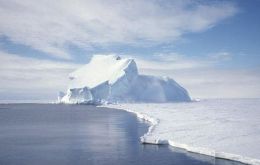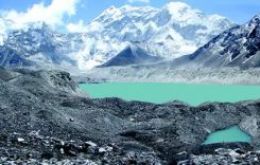MercoPress. South Atlantic News Agency
Tag: melting
-
Thursday, February 24th 2022 - 07:47 UTC
Antarctic sea ice set of a new record low minimum, Greenpeace

Greenpeace reports that data from the National Sea Ice Data Center shows that this year Antarctic sea ice will reach the lowest extent on satellite record. Preliminary measurements show the sea ice around the continent has surpassed the previous record minimum set, in March 2017, of 2.1 million square kilometers, dropping to 1.98 million square kilometers on Sunday 20 February.
-
Thursday, June 14th 2018 - 07:24 UTC
Antarctica ice sheet melting faster than expected, adding 0.6mm to sea level every year

The Antarctic ice sheet has lost more than 2,500 billion tons of ice in the past 25 years and nearly half of that has happened since 2012. An international team of polar scientists found that melting in Antarctica has jumped sharply from an average of 76 billion tons per year prior to 2012, to around 219 billion tones each year between 2012 and 2017.
-
Wednesday, May 20th 2015 - 20:34 UTC
Research icebreaker Polarstern en route to investigate climate change in Arctic

Research icebreaker Polarstern left its home port in Bremerhaven on Tuesday setting a course for the Arctic. Led by Dr Ilka Peeken from the Alfred Wegener Institute, Helmholtz Centre for Polar and Marine Research (AWI) a team of 53 researchers from 11 countries will investigate the effects of climate change in the Arctic, from the surface ice floes down to the seafloor
-
Sunday, October 5th 2014 - 10:05 UTC
Huge gathering or Pacific walruses in Alaska beach because of climate change

Scientists have photographed the largest gathering of Pacific walruses ever recorded, on a beach in northern Alaska, blaming climate change for the estimated 35,000 females and calves huddled beside the Chukchi Sea.
-
Wednesday, May 28th 2014 - 22:04 UTC
Antarctica ice sheet melting episodes have occurred over the last 14.000 years, say scientists

A new study has found that the Antarctic Ice Sheet began melting about 5,000 years earlier than previously thought coming out of the last ice age, and that shrinkage of the vast ice sheet accelerated during eight distinct episodes, causing rapid sea level rise.
-
Tuesday, April 5th 2011 - 08:59 UTC
Mountain glaciers in the Andes are melting the fastest in 350 years

Melting mountain glaciers are making sea levels rise faster now than at any time in the last 350 years, according to new research. Universities at Aberystwyth, Exeter and Stockholm looked at longer timescales than usual for their study.
